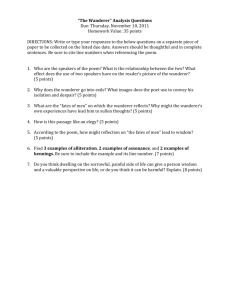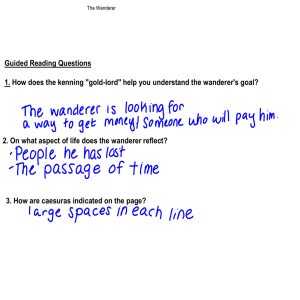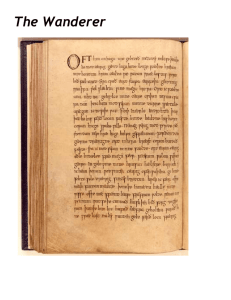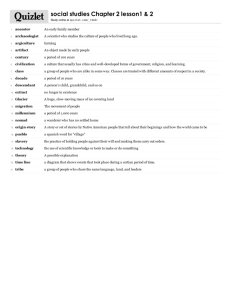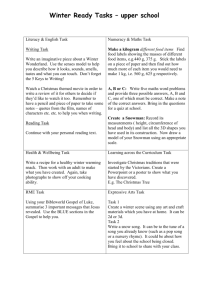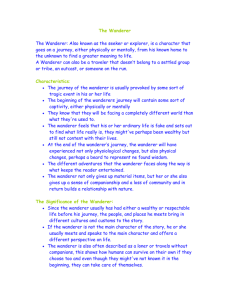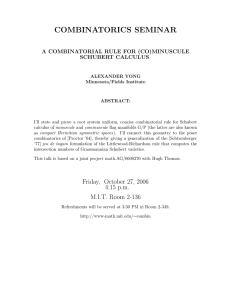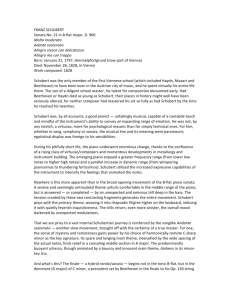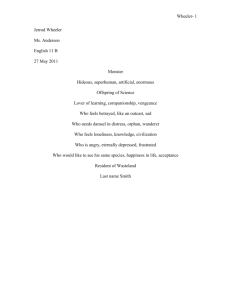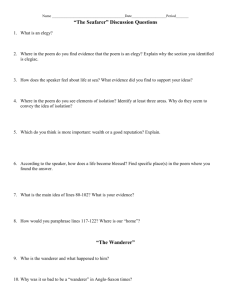Following the Path of a 'Winter Journey':
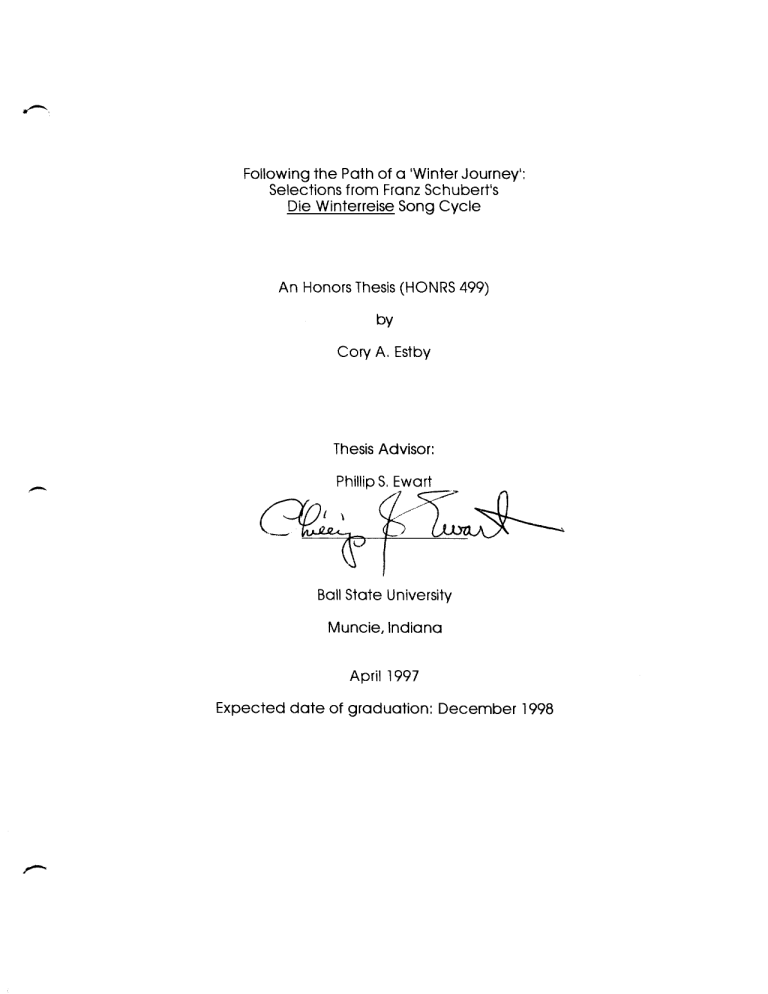
Following the Path of a 'Winter Journey':
Selections from Franz Schubert's
Die Winterreise Song Cycle
An Honors Thesis (HONRS 499) by
Cory A. Estby
Thesis Advisor:
Phillip S. Ewart
~// ~
Ball State University
Muncie, Indiana
April 1997
Expected date of graduation: December 1998
7' 1
• ...-'"t
Purpose of Thesis
This project entails the research and performance of selections from
Franz Schubert's Die Winterreise song cycle. Comprising 11 of the 24 pieces from j"his dark and gloomy song cycle, this recital includes lecture notes showing the storyline of the poetry as well as the compositional techniques tllat portrayed this text. Finally, this project contains a recital program, audience translations of the text, and publicity flyers. The audio cassette of tllis performance shows the true portrayal of a human soul, in following the path of a 'winter journey'.
-
FOLLOWING THE PATH OF A 'WINTER JOURNEY':
Selections from Franz Schubert's
Die Winterreise Song Cycle
Good eVE!ning and thank you for coming to this Honors Recita\. Before embarking on trle winter journey, I would like to thank the following for their assistance and encouragement in the development and completion of this
Honors project.
• Dr. Phillip Ewart--my vocal instructor for the last three years. His guidance and knowledge as my faculty advisor for this project is appreciated.
• My parents, Alan and Ruth Estby--for their unending emotional support and love through the good times and the hardships.
• Christena Jones--my accompanist and girlfriend; supportive in all I do. Her willingness to assist me is a testament to her talent (as she is also completing an Honors project this semester!)
• David and Sandra Jones--for their encouraging words and assistance.
• All of my peers and companions who have motivated me to keep singing and enjoying life.
Totaling 24 songs, the Winterreise song cycle was officially completed in
1827, several years after the first notes were ever written, but only one year before the death of its heralded composer. Based on a setting of text by Wilhelm
Muller, Franz Sc~)ubert composed the cycle in two segments, as emulated in tonight's recital. Schubert chose to place several songs in a different order than that of the original poetry, but this realignment has little effect on the overall textual meanin~~. The text describes a man forsaken by his love, as he embarks on a solitary journey into the depths of being. Is he a jilted lover or an alienated man destined for insanity?
This song cycle brings the listener and performer eerily close to its strange and sad intensity, that being the portrayal of a human soul. "The re-creation of this work through performance is more than a telling of a tale, but a 'novella' of time present and time remembered," as we follow the path of a 'winter journey',
Lecture Notes
Gute Nacht:
The first song in this cycle alludes to the ending of the plot, and leaves the inevitable outcome to be captured by the remaining songs. As the wanderer embarks on his journey, he says good-bye and good-night to his lost love.
Rejected by his lover, he has abandoned all of life's meaning and longs for the end. Das Modchen sprach von liebe (the girl spoke of love), but all love is lost.
The piano postlude with continuous eighth notes diminishes towards oblivion, conveying the t)oundless sorrow of the traveler, as he begins his journey through the winter with no hope left in his heart.
-.
Gefrorne Tronen:
While reminiscing the past, he recalls being rejected by his love. This pain and rejection forces tears from his eyes, which are immediately frozen on his face upon contact with the cold, icy air. All of his sorrow produces questions from his heart, but to no avail. He refuses to search any longer for answers; his questions unanswered and his sorrow unresolved.
Auf dem Flusse:
Four songs later into the cycle, thoughts that appeared in Gefrorne Tronen reappear, but also bring about new, impelling questions. Looking at a frozen stream, the traveler imagines a carved tombstone. Is the tombstone for his lover or for himself? Tilat is for the listener to determine, but a resounding 'Yes' could be the ultimate answer for either interpretation. Once again, the piano postlude foretells the exhoustive state of the wanderer, following the intense selfinterrogation of his grief-stricken heart.
-
-
Fruhlingstraum:
After all ttle self-examination the wanderer has inflicted upon himself, he finally falls asleep and dreams of a springtime vista with May flowers, green meadows, and birdsongs. His inner emotional being produces these thoughts, but he is quickly awakened by cocks crowing and ravens croaking on the roof.
He soon realizes that his dream is only an illusion, as the wanderer remains surrounded by
Cl cold and isolated frozen tundra. Even though the title indicates a 'ray of hope', it is actually a suspended boost of energy and compulsion for the wanderer to keep going.
Einsamkeit:
Concluding the first part of the cycle, Schubert reverts to the beginning song, Gute Nacht. The opening phrase on the piano maintains the 'walking motion' style, as the wanderer is now 'sluggish of foot'. Totally depleted of energy, lonely and ungr'geted, the wanderer struggles through the lamentation of his prior springtime dream. He is finally overcome with weakness. The piano postlude signifies his depletion of energy, as defeat is now apparent. The wanderer is now even more miserable and wearier than when he began his winter journey.
At the conclusion of the first part, we will immediately continue our winter journey, just as the wandlerer is unable to end his sorrow.
-
-
Die Post:
Picking up the story line, the wanderer, who was left weary, must rejuvenate his energy, and begin his 'walking motion' journey once again.
(Christena plays the posthorn on the piano.) Ahhhh, the sounds of a posthorn, delivering mail to bright, smiling faces as they receive letters from their loved ones. But, alas, no letter ever comes from his beloved. The unhappy wanderer hears the posthorn, but could it actually be his invitation to escape the sorrow?
Before he realizE3s why he feels this emotional surge, the coach is long gone, and he must again continue his winter journey.
Die Krahe:
Could it t)e that death is near for the wanderer, as a raven, the traditional symbol of deatt"" continually circles over his head? The mounting depression rooted in the wonderer is too much to handle; he wishes his life would end.
Turning from his contemplative addressings of the past, the wanderer directly confronts the raven, resulting in an outburst of desperation and hopelessness.
Der StUrmische Morgen:
Not forgetting his confrontation with the raven, this next outburst is of furious energy, as witnessed by the ferocious tempo. (Ultimately creating the shortest song of the entire cycle.) The wanderer is actually revitalized by the stormy morning, and the turmoil that the storm represents. This upswing will not last long though, as depression and deception soon set in.
-Tauschung:
After the furious energy of the previous song, the repetitive nature of the piano part in Tauschung can only symbolize the on-coming insanity of the wanderer. This l:ixated song blinds the wanderer with deceptive thoughts, yet one thought of 'his is not deceptive; death looming overhead for the travelling man.
-
Dos Wirtshaus:
As he truclges along his path, the wanderer happens upon a burial ceremony. The wanderer does not think of religious purification, but rather of a hospitable inn, where tired wanderers may rest for a while. While this metaphor is obvious, the wanderer feels that the grave is his only refuge. Denied of rest by the 'so-called inn' because all the rooms are occupied, the wanderer continues his winter journey.
Der Leiermann:
The end of the winter journey has arrived with the last song of the cycle.
Beginning with on effective piano part imitating that of a hurdy-gurdy or organ grinder, (or could it be the wanderer limping along after a long, hard winter journey?), the wanderer soon realizes that there is no escape from his agony.
Barefoot on ice, staggering to and fro, with dogs snarling at him, the last chord symbolizes the wanderer's worst fear. The last chord is only a foretelling of the future ... a future of nothingness. Nothingness is the eventual reconciliation for the wanderer. His winter journey carries into oblivion, with no complete resolution.
-.
-
BALL STATE UNIVERSITY
COLLEGE OF FINE ARTS
SCHOOL OF MUSIC
CORY A. ESTBY
baritone ina
SENIOR HONORS RECITAL with
Christena Jones, piano
SELECTIONS FROM WINTERREISE
1. Gute Nacht (Good Night)
3. Ge-frorne Trdnen (Frozen Tears)
7. Auf dem Flusse (At the Stream)
11. FrLlhlingstraum (A Dream of Springtime)
12. Einsamkeit (Loneliness)
13. Die Post (The Post)
15. Die Krdhe (The Crow)
18. Der sturmische Morgen (A Stormy Morning)
19. TdlJschung (Deception)
21. DCls Wirtshaus (The Inn)
24. Der Leiermann (The Organ Grinder)
Franz Schubert
(1797-1828)
Cory A. Estby is a student of Phillip S. Ewart and a member of the collegiate MENC.
This recital is presented in partial fulfillment of a Senior Honors Project.
PRUIS HALL
Thursday April 3, 1997
5:30 pm
CORY A. ESTBY baritone ina
SENIOR HONORS RECITAL with
Christena Jones, piano
Selections from Winterreise
1. Gute Nacht (Good Night)
3. Gefrome Tranen (Frozen Tears)
7. Auf dam Flusse (At the Stream)
11. Fruhlingstraum (A Dream of Springtime)
12. Einsamkeit (Loneliness)
13. Ole Post (The Post)
15. Die Krahe (The Crow)
18. Der sturmische Morgen (A Stormy Moming)
19. Tauschung (Deception)
21. Oas Wirtshaus (The Inn)
24. Oer Leiermann (The Organ Grinder)
Franz Schubert
(1797-1828)
Cory A. Estby is a student of Phillip S. Ewart.
This recital is presented in partial fulfillment of the requirements for the Honors Program at Ball State University.
PRUIS HALL
Thursday. April 3, 1997
5:30p.m.
Series U
Number 164
In keeping with copyright and artist agreements, use of recording and photographic devices is not permitted by other than approved university personnel.
We request your cooperation.
For performance information, call the School of Music Concert HoU..ine: 285-5878.
--------------------
-------
-
Gute Nacht (Good Night)
A stranger I arrived, a stranger I depart again.
May time favorE~d me with many bunches of flowers.
The girl spoke O'f love, her mother even of marriage-now the world is gloomy, the path veiled in snow.
For my journey I may not choose the time;
I must find my own way in this darkness.
A mooncast ShCldow goes with me as my companion and on the white fields
I search for the footprints of deer.
Why should I stay longer, until I am driven away?
Let stray dogs howl in front of their master's house.
Love loves to rove--
God made us so-from one to another;
Dear love, gooe1 night!
I will not disturb 'IOU in your dreams-that would spoil your rest; you shall not heor my footsteps-soft, softly shut the door!
As I leave I shall write upon your gate 'Good Night', so that you may see
I have been thinking of you.
Gefrorne Tronen (Frozen Tears)
Frozen tears are falling from my cheeks.
Did I not notice that I was weeping? o tears, my tears, are you so lukewarm that you turn to ice like the cold dew of dawn?
Yet you spring from a surging breast so burning hot that you should melt the ice of all winter.
Auf dem Flusse (At the Stream)
You, who used to rush along so gaily, bright, violent stream, how quiet you have become; you give me no greeting as we part.
With hard, stiff frost you have covered yourself; you lie cold and motionless, stretched out in the sand.
On your crust I carve with a sharp stone the name of my beloved, and the hour and the day.
The day I first met her, the day that I went away, round name and figures winds a broken ring.
In this stream, my heart, do you recognize your likeness?
Under its crust is there too a roaring surge?
-,
-
Fruhlingstraum
(A Dream of Springtime)
I dreamed of goy flowers such as blossom in May;
I dreamed of green meadows, and the merry calling of birds.
And when the cocks crowed, my eyes awoke; it was cold and dark; the ravens croClked on the roof.
But there on the' windowpanes who had been painting leaves?
You may well laugh at the dreamer who saw flowers in the winter.
I dreamed of love for love, of a fair maiden, of hearts and kisses, of bliss and joy.
And when the cocks crowed, my heart awoke.
Now all alone I sit here, and ponder my dream.
I shut my eyes again; my heart still beots warmly.
When will your IBaves grow green on the window?
When willi hold my darling in my arms?
Einsamkeit (Loneliness)
Like a mournful cloud passing through the clear air when through the fir tops a gentle breeze blows-so I wend my way onward with halting step, through bright, happy life lonely and ungreeted.
Must the air be so calm?
Must the world be so bright?
When the tempests were howling,
I was not so wretched.
Die Post (The Post)
From the street there a posthorn is sounding.
What is it that makes you leap up so, my heart?
The post brings you no letter; they why do you throb so strangely, my heart?
Well, the post is coming from the town where I had a dear darling, my heart!
Do you just want to look across and ask how things are going there, my heart?
Die Krahe (The Crow)
A crow was with me when I left the town, and back and forth till now has flown abovj~ my head.
Crow, you strange creature, will you not forsoke me?
Do you hope for prey here soon, hope to seize my body?
Well, there is not far to go on this journey.
You, crow, let me at last see constancy to the grave.
Das Wirtshaus (The Inn)
My path has brought me to a graveyard;
I thought to myself
I would lodge here.
These verdant funeral wreaths might well be the signs that invite tired travelers into the cool inn.
But in this house are all the rooms occupied?
I am tired enough to drop, sick unto death.
Der stUrmische Morgen
(A Stormy Morning)
Pitiless landlord, do you turn me away?
Then onward, lead me onward, my trusty staff!
Look how the storm has torn the grey mantle of heaven!
The cloud-flecks flutter about, sparring -feebly.
And tongues of red fire flicker among trlem.
This is what I call a morning really to my tastj~!
Der Leiermann
(The Organ Grinder)
There beyond the village stands an organ grinder, and with numb fingers he grinds as best he can.
My heart sees in the sky its own painted portrait; it is nothing but winter, winter chill and savage.
Barefoot on the ice, he staggers to and fro, and his little plate stays ever empty.
Tauschung (Deception)
No one wants to hear him, no one gives him a glance, and the dogs snarl round the old man.
A friendly light donces in front of me,
I follow it hither Clnd thither.
Follow it gladly Clnd watch its course as it lures the traveler onward.
Ah, anybody as wretched as I
And he lets it all go by, as it will do; he grinds, and his organ never stands still. yields gladly to ttlis bright deceit.
Strange old fellow, For, beyond ice and dreariness, it reveals a CheE!rful, warm house, where dwells a (jear creature. shall I go with you?
Will you grind your organ -
My only success is in pretense! to my singing?
\
) )
CORY AI ESTBY
BARITONE
with Chiistena Jones, piano
IN A SENIOR HONORS RECITAL
Selections from
SCHUBERT'S
SONG CYCLE
Thursday
APRIL 3, 1997
5:30pm
Pruts Hall
)
r----_ ... ,
CORY AI ESTBY
BARITONE
with Cr-Histena Jones, piano
IN A SENIOR HONORS RECITAL
Selections from
SCHUBERT'S alB "llivaBRBIIB
SONG CYCLE
FrllllZ
j'chttlJerl
/"P II<,!.'I
Thursday
APRIL 3, 1997
5:30pm
Pruis Hall
-
Self-Evaluation
After the anxiety and stress ended upon the completion of my recital, a brief self-evaluation is necessary to sum up this project. Through the many hours of rehearsal and research, I found myself increasingly enjoying the brilliance of the poetry and musical composition. In researching each selection, I was astounded by the wholeness of the storyline, eVHn though I only performed selections from the song cycle. Die
Winterreise is a song cycle that compels one to return again and again, like the reading of a favorite book. My performance of the selected songs from this cycle is no exception. The more intensive the inner relationship to the work, the more extensive and involuntary the effect that radiates from it. By combining lecture notes with the actual performance, the text had more meaning for the audience, but also provided a medium for me, the performer, to draw closer to it.
--
BIBLIOGRAPHY
CottrelL Alon. Wilhelm Muller's Lyrical Song Cycles. University of
North Carolina Press: Chapel HilL 1970.
Feil, Arnold. Frank Schubert. Amadeus Press: Portland, Oregon,
1975.
Fischer-Dieskau, Dietrich. Schubert's Songs: A Biographical Study.
Alfreej A. Knopf, Inc: New York, 1976.
Fischer-Dieskau, Dietrich. Schubert: Winterreise. CD Recording.
1972 Polydor International. with Gerald Moore, accomp.
Schubert, Franz. Wlnterreise. Online--http://www.ualberta.ca/
-Krotlbie/PianoChamber /schubert.html November 13, 1996
Schubert: Winterreise Review. G.J. Stereo Review, July 1996.
Schubert: Vvinterreise Review. Keller, James A. Opera News,
November 1993.
Schubert: Vvinterreise Review. Zakariasen, Bill. Opera News,
August 1996.
Youens, Susan. Retracing a Winter's Journey. Cornell University
Press: Ithaca, NY, 1991.
